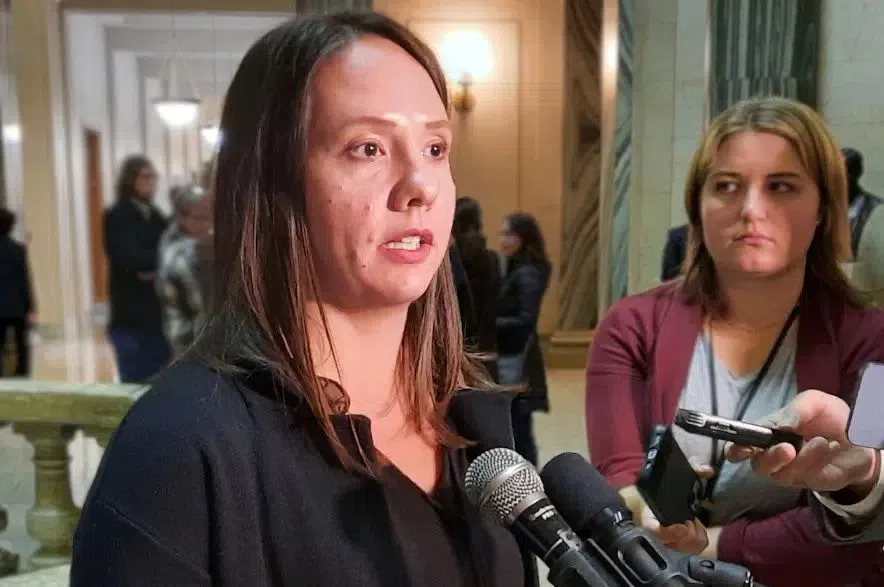World
STF president explains decision to turn down arbitration in contract dispute

Back in March, it was seen as part of the solution. Now, teachers are saying no.
The Saskatchewan Teachers’ Federation rejected an offer to take contract negotiations to binding arbitration on Wednesday, instead declaring another impasse in negotiations and promising to resume work-to-rule sanctions on Monday.
Federation president Samantha Becotte spoke to media on Thursday to explain the decision.
“Back in March, we hadn’t, in my perspective, experienced bargaining at the table. There hadn’t been any good-faith negotiations back and forth. So we saw (binding arbitration) as the only option to move the process forward,” Becotte said.
“Now we’ve had a full week back in May of good-faith negotiations and back-and-forth conversations.”
Becotte said the federation no longer sees arbitration as a solution, despite federation members rejecting two previous contract offers. She said arbitration could actually delay a resolution in the long-running dispute even further.
“Binding arbitration can be a very long process,” Becotte said.
“There’s a concern that if we go there now, given that we are a few months down the road from where we were before when we had first asked for it, it just means that the solutions aren’t going to come to classes as soon as possible.”
She also thinks binding arbitration would exclude teachers from the discussion.
“If it goes to arbitration, it involves a third party like a lawyer who is potentially less connected,” she said. “It is a long process and it excludes teacher voice(s) within that process, as its an imposed agreement that comes. And teachers have been highly engaged through this process and, like I said, we want to find solutions that are going to work for them and their students.”
As the school year comes to a close, Becotte said she remains optimistic that a solution will be reached sooner rather than later.
“I do think that we are close to finding a solution that would be agreeable,” she said.
“We’d prefer to do that through negotiations. As the minister has said before, the best agreements are negotiated. I think that there’s a way we can get to a negotiated agreement.”
Becotte said the federation and teachers are not divided, despite members rejecting the latest contract offer by a very narrow margin, and teachers are prepared to fight for public education through the summer if bargaining hasn’t concluded by then.
“I have never experienced a time in my career where teachers are more united to find solutions and start to see real improvements to their experiences in schools,” she said.
Graduation up in the air
With sanctions set to resume on Monday, graduating students are wondering what it means for them and their planned ceremonies.
“That’s one of the most frustrating parts of where we’re at today,” Education Minister Jeremy Cockrill told reporters on Thursday.
Education Minister Jeremy Cockrill says he’s working with school divisions to ensure grad ceremonies can go forward despite possible sanctions from teachers. (Lisa Schick/980 CJME)
Cockrill said he will be talking with school divisions this week to ensure students can walk across the stage with their diplomas, regardless of sanctions.
He said the government has been talking with all 27 Saskatchwan school divisions over the last several months to ensure they are ready to hold graduation celebrations.
“We’ve been, asking those divisions ‘How can we help? How can we support you and making sure that students that are graduating this year have an opportunity to celebrate the hard work that they’ve put in,’” the minister said.
Cockrill said 24 out of the 27 school divisions have told him they’ll have no issue carrying out grad ceremonies as planned.
“There’s a small handful of school divisions that have expressed concerns about their ability to make those events happen,” he noted.
With those conversations continuing this week, he said the ministry is hoping to come up with a plan with the three school divisions that are struggling.
“I think once we get some clarity from school divisions in terms of specifics, we’ll evaluate that,” Cockrill said.
In the meantime, teachers in Saskatchewan schools aren’t putting in time outside of class hours, including working on extracurriculars or graduation planning.
Becotte said she also wants to see students celebrate their graduation.
“We’ve provided some direction to our members in terms of what can and can’t continue,” she said
“We have told our members that within these sanctions teachers won’t be supporting the planning or facilitation of graduation events. But there’s a way to avoid all of this, and that’s to get back to the table and get to an agreement where we’ll start to see real improvements to classrooms coming up in September.”
Becotte said the sanctions that are set to begin Monday could still be withdrawn if negotiations resume.
“I’d be happy to withdraw them before Monday if the government came back with a willingness to negotiate some of those real solutions before that time,” she said, “but that’s up to them.”
–with files from 980 CJME’s Abby Zieverink and Nicole Garn


)






